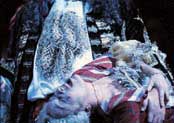OPERA SEARCH

Der Bajazzo
(I Pagliacci) (1892)Libretto by the composer with German translation by Ludwig Hartmann (I,G)
S,2T,2Bar; chorus
3.2.2.bcl.3-4.3.3.1-timp.perc:BD/cyms/tgl/bells-2harp-strings
Abbreviations (PDF)
Boosey & Hawkes
Teatro dal Verme, Milan
Conductor: Arturo Toscanini
Company: Teatro dal Verme
| CANIO (in the play, 'Pagliaccio'), head of a group of strolling players | Tenor |
| NEDDA (in the play, 'Colombina', Columbine), wife of Canio | Soprano |
| TONIO (in the play 'Taddeo'), a clown | Baritone |
| BEPPE (in the play, 'Arlecchino', Harlequin) | Tenor |
| SILVIO, a villager | Baritone |
| Villagers | Chorus |
The Feast of the Assumption in about 1865-70, Montalto, in Calabria
A group of strolling players arrives in a Calabrian village and advertises the performance they will put on in the evening. Their leader Canio goes off to have a drink while the stage is set up. During his absence, his wife Nedda finds herself the unwilling object of the attentions of the deformed clown Tonio, whom she violently rejects: he swears vengeance. Once he is gone she is better pleased to meet the villager Silvio, with whom she plans to elope after the performance. Having spied on them, Tonio disappears to find Canio, whom he brings back in time to hear their final avowals. Silvio is chased away unrecognised, but Canio must don his costume and attempt to play the clown. As darkness falls the play begins, an old harlequinade whose situations bear a striking resemblance to the real life relationships of the actors. Canio's entrance finds him increasingly unable to distinguish truth from fiction, and eventually he stabs his wife in earnest, then Silvio, who has come to her aid. Tonio turns to the audience and announces that the comedy is over.
Dramatic, Tragic
